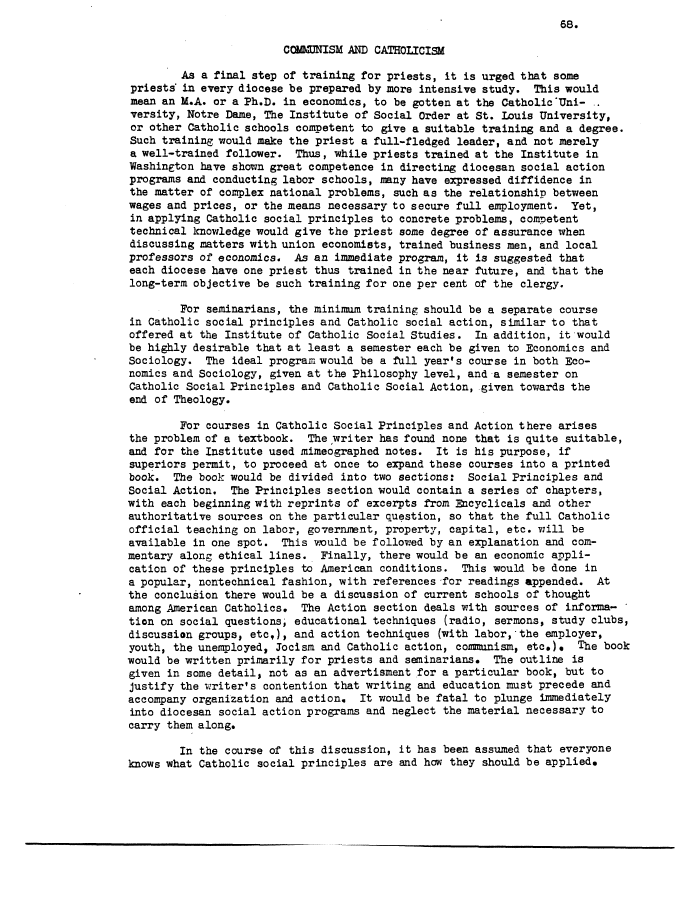 |
||||
 |
||||
| 68. COMMUNISM AND CATHOLICISM As a final step of training for priests, it is urged that some priests' in every diocese be prepared by more intensive study. This would mean an M.A. or a Ph.D. in economics, to be gotten at the Catholic"Qni- .. versity, Notre Dame, The Institute of Social Order at St. Louis University, or other Catholic schools competent to give a suitable training and a degree. Such training would make the priest a full-fledged leader, and not merely a well-trained follower. Thus, while priests trained at the Institute in Washington have shown great competence in directing diocesan social action programs and conducting labor schools, many have expressed diffidence in the matter of complex national problems, such as the relationship between wages and prices, or the means necessary to secure full employment. Yet, in applying Catholic social principles to concrete problems, competent technical knowledge would give the priest some degree of assurance when discussing matters with union economists, trained business men, and local professors of economics. As an immediate program, it is suggested that each diocese have one priest thus trained in the near future, and that the long-term objective be such training for one per cent of the clergy. For seminarians, the minimum training should be a separate course in Catholic social principles and Catholic social action, similar to that offered at the Institute of Catholic Social Studies. In addition, it would be highly desirable that at least a semester each be given to Economics and Sociology. The ideal program would be a full year's course in both Eco- nomics and Sociology, given at the Philosophy level, and a semester on Catholic Social Principles and Catholic Social Action,.given towards the end of Theology. For courses in Catholic Social Principles and Action there arises the problem of a textbook. The writer has found none that is quite suitable, and for the Institute used mimeographed notes. It is his purpose, if superiors permit, to proceed at once to expand these courses into a printed book. The book would be divided into two sections: Social Principles and Social Action, The Principles section would contain a series of chapters, with each beginning with reprints of excerpts from Encyclicals and other authoritative sources on the particular question, so that the full Catholic official teaching on labor, government, property, capital, etc. will be available in one spot. This would be followed by an explanation and com- mentary along ethical lines. Finally, there would be an economic appli- cation of these principles to American conditions. This would be done in a popular, nontechnical fashion, with references for readings appended. At the conclusion there would be a discussion of current schools of thought among American Catholics. The Action section deals with sources of infonna- ' tion on social questions, educational techniques (radio, sermons, study clubs, discussion groups, etc,), and action techniques (with labor,"the employer, youth, the unemployed, Jocism and Catholic action, communism, etc.)« The book would be written primarily for priests and seminarians. The outline is given in some detail, not as an advertisment for a particular book, but to justify the writer's contention that writing and education must precede and accompany organization and action. It would be fatal to plunge immediately into diocesan social action programs and neglect the material necessary to carry them along. In the course of this discussion, it has been assumed that everyone knows what Catholic social principles are and how they should be applied. |